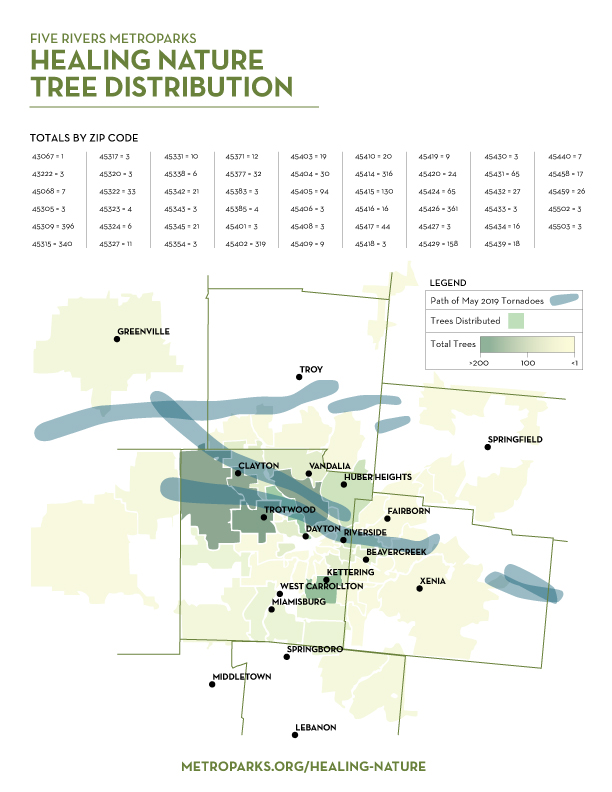In The Community
Healing Nature

In fall 2020, Five Rivers MetroParks gave away 2,781 native tree seedlings at Wegerzyn Gardens MetroPark and the 2nd Street Market as part of MetroParks’ reforestation initiative, Healing Nature. The initiative is designed to assist property owners and communities in Montgomery County that were impacted by the 2019 Memorial Day tornadoes.
“Five Rivers MetroParks has a specific long-term role to play in efforts to recover from the tornadoes, which is restoring lost habitat,” said Becky Benná, Five Rivers MetroParks’ executive director. “An untold number of trees, shrubs and other plants critical to our region’s wildlife and natural heritage were lost during the storms. It’s important we replant in the areas where so many were lost to tornado damage.”
The trees given away were propagated by MetroParks staff and volunteers at the Barbara Cox Center for Sustainable Horticulture.
The map below illustrates the ZIP codes of people and communities who picked up trees, and where these locations are in proximity to the paths of the 2019 Memorial Day tornadoes.

Caring for tree seedlings
Those who collected tree seedlings should follow planting directions to ensure their trees thrive in their community or personal greenspace. Watch the video from the Arbor Day Foundation below or view our guide for planting and watering instructions.
Cold weather care
If you have not yet planted your tree seedlings, it is important to do so now. Your tree has a much better chance of surviving the winter if planted in the ground rather than a container.
Deciduous trees – the type MetroParks gave away during the Healing Nature native tree seedling giveaway – have adapted to life in cold-winter climates by going dormant. Many of the trees’ natural changes, such as losing their leaves in the autumn, ensure these plants enter dormancy before the coldest weather arrives and allow them to stay dormant until spring.
Because plant roots may not have grown very far into the soil, it’s especially important to water newly planted trees thoroughly until the ground freezes.
Once the ground is frozen, apply a 3-inch to 4-inch layer of insulating mulch, such as bark mulch or pine straw, around the base of the plant. Doing this helps insulate the soil so it stays frozen and helps prevent heaving, which occurs when the freezing and thawing of the soil pushes the tree out of the ground. Keep mulch several inches away from the trunk to prevent rot and discourage rodents from chewing on the plant.
Protecting your tree from critters
Gnawing mice and rabbits can easily damage your tree’s tender, young bark. Protect the trunks of your young plants with tree guards made of wire. You can find tree wraps and guards at garden centers and hardware stores – or construct one of your own!
How to make a wire tree guard
Materials required:
- Metal hardware cloth or metal fencing material
- Wire cutters
- Wire/plastic zip ties
Instructions:
Cut the wire fencing material to whatever length you need to surround the tree trunk with extra room for up to four years of growth. Make the guard between 2 feet and 4 feet high. Wrap it around the tree’s trunk in a cylinder shape. For extra protection, bury the guard about 2 inches in the soil to hold it in place and keep out critters. Connect the edges of the fencing material with wire or plastic zip ties to keep it closed.
Healing nature
Healing Nature was launched in January 2020 as a two-part initiative. In addition to the reforestation effort, Healing Nature also focused on encouraging the community to take advantage of the access to nature MetroParks provides. That content can now be found at metroparks.org/natureisopen and on Five Rivers MetroParks’ social media channels (Facebook, Instagram, Twitter and YouTube).
Donations can be made to the Five Rivers MetroParks Foundation to support Healing Nature. Funds will be used to help restore lost habitats in tornado-damaged areas, including Wegerzyn Gardens MetroPark. To make a donation, visit www.metroparks.org/about/foundations/or contact Alexis Larsen, chief of philanthropy, at 937-275-PARK or Alexis.Larsen@metroparks.org.
“Trees not only provide habitat for wildlife and places of respite for humans,” Benná said. “Trees improve air quality, mitigate stormwater, provide shade and enhance aesthetic beauty, and increase property values. It’s important we heal the nature that heals our community.”


